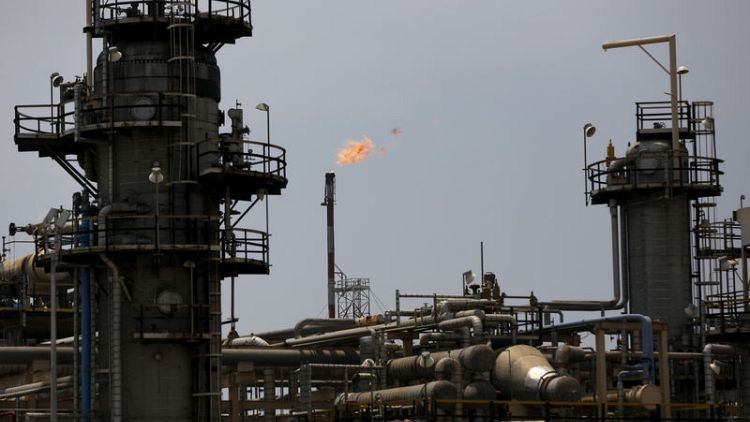By Jessica Jaganathan and Wilda Asmarini
SINGAPORE/JAKARTA (Reuters) - Indonesia is pushing to nationalise more of its oil and gas assets as it tries to reduce imports and boost government revenue amid emerging market turbulence that has staggered Southeast Asia's biggest economy.
Since 2015, whenever product-sharing contracts with international companies expire, the government has increased state-owned Pertamina's stakes the related oil and gas fields.
The goal is to accelerate a four-year-old plan that aims to send domestic crude oil to Indonesian refineries for local use.
But experts say that is risky because it discourages investors and global energy companies who have expertise crucial to maintaining Indonesia's output.
"Getting rid of the international oil companies' involvement means Pertamina will be losing valuable technical and operational know-how," said Den Syahril, a senior oil analyst at consultancy FGE, adding that it could result in "lower productivity at its fields."
Oil and natural gas are two of Indonesia's biggest cash earners, but their contribution to government revenue has declined along with output, shrinking from more than 20 percent a decade ago to under 5 percent last year, according to government data.
President Joko Widodo, running for re-election in 2019, told supporters this month that he would "safeguard national resources" by nationalizing assets like the large Rokan and Mahakam oil blocks.
In 2021, Pertamina will take over the Rokan block, Indonesia's second-largest crude producing field, from current operator Chevron <CVX.N>.
It already took over Mahakam from France's Total <TOTF.PA> and Japan's Inpex <1605.T> this year.
Consultancy PwC says in its 2018 oil and gas investment guide "that crude oil production in Indonesia has been on a downward trend for the past decade" and that its oil industry has entered a "transitional phase, with a growing domestic need for gas for both consumers and industrial use."
A SLOWING FLOW
Indonesia's crude oil output has been declining for decades, from a peak of more than 1.5 million barrels per day (bpd) in the 1970s and 1990s, to below 800,000 bpd now, according to industry data.
Government oil and gas revenues have fallen too, from around 400 trillion rupiah ($22.60 billion) in 2010 to 135 trillion in 2017, according to data from SKKMigas.
The situation does not appear likely to improve on its own.
Indonesia is on track to spend far less than planned on its 2018 oil and gas investments. In the first half of the year it spent only $3.9 billion, compared with its target of $14.2 billion, according to regulator SKKMigas.
Just five years ago, the country was investing about $20 billion a year into the industry.
"The country's failure to attract new foreign investment in the upstream sector has seen licensing activity and development drilling fall to decade low levels," FGE's Syahril said.
Indonesia must act soon if it wants to turn around its declining output, which has already forced the country out of the Organization of the Petroleum Exporting Countries (OPEC).
Without significant spending increases, Rachel Chua of Moody's Investors Service said Indonesia has only 10 years of oil production left, warning that nationalising oil and gas fields would crimp foreign investment.
Pertamina has estimated that Rokan would require about $70 billion in investment over the 20-year life of its contract.
BEST CANDIDATE?
Other regional oil companies like Malaysia's state-owned Petronas or Thailand's PTT have successfully sought international partners for major projects.
In Indonesia, leases on a dozen oil and gas blocks will expire between 2021 and 2026, and 15 blocks expiring between 2017 and 2021 have already been given to Pertamina.
The country's deputy energy minister, Arcandra Tahar, told reporters in August that Rokan was awarded Pertamina was because the company made the best offer.
Tahar said Pertamina offered the biggest signing bonus, the highest government production revenue and lower discretion of his ministry on production split made it easier for the energy minister to change how revenue is divided up.
He said these factors would be considered in awarding future leases on expiring blocks.
Pertamina aims to increase production by focusing on undeveloped fields in Rokan, said Syamsu Alam, the company's former director of upstream. He was replaced on Wednesday by Dharmawan Samsu, previously the country head of oil major BP <BP.L>. Samsu declined to comment.
"If it goes well, hopefully we can control the decline rate so that production after 2021 won't drop too much," Alam told Reuters. "Hopefully we can maintain it or even increase it."
Pertamina is poised to benefit regardless.
Chua of Moody's said the addition of the Rokan block would increase the share of Indonesian oil Pertamina uses at its refineries, which have a combined capacity of 1 million bpd, to 40 percent from the current 35 percent.
At current costs for Brent crude <LCOc1>, that equates to savings of $30 million per day.
($1 = 14,605.0000 rupiah)
(Reporting by Jessica Jaganathan in SINGAPORE and Wilda Asmarini in JAKARTA; Editing by Henning Gloystein)



